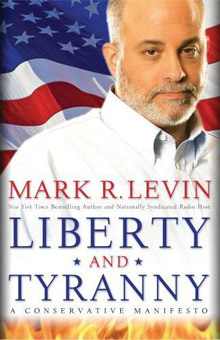
Mark R. Levin,Liberty and Tyranny: A Conservative Manifesto
256 pages, Threshold Editions, March 24, 2009
Highest Position Reached on NYT Best Seller List: No. 1 (12 weeks)
Readability: 6
Digestibility: 4
Crazy Factor: -3
Overall Score: 7
To understand why Mark R. Levin's book has been such a success — and why it is probably the most influential piece of writing among American conservatives in years — you need to understand the ideological dilemma faced by "movement conservatives." That's the coalition cobbled together over the past 40 years or so, beginning with Richard Nixon's "Silent Majority," and over time adding on more factions (Christian conservatives, gun-rights advocates, neocons, libertarians, etc.), as the business-backed Republican Party tried to maintain a path to victory out of the decreasing population of their key demographic: working white men and stay-at-home wives.
That's a bit of a simplistic history, but one way or another we've reached a point where tens of millions of movement conservatives are in widespread agreement on a disparate set of policy tenets that defy inclusion in a single, coherent, ideological belief system.
Levin has set forth to provide a new framework, in this small, quick-reading screed — and given it a snappy title — that encapsulates a simple us-versus-them ideology. Frankly, I don't think his tract is as coherent and convincing as Glenn Beck's Common Sense, but Levin's has clearly become the new conservative gospel. (He probably gets taken more seriously because of the beard.)
So, what is this new "Conservative Manifesto" that ties everything together? It goes as follows: there are two political camps, conservatives and statists; the former love liberty, and the latter prefer tyranny. And . . . that's it. As universally applicable political philosophies go, it surely has the advantage of being easy to remember.
From there, it's just a matter of conveniently wrapping that conceit around whatever Levin already believes — in other words of finding "liberty" on his side of the argument.
Sometimes, as with imposition of English, enshrining Judeo-Christian morals into law, or warrantless wiretapping, Levin finds liberty on the side of protecting what is essential to American culture and tradition.
Other times, as when government seeks to keep people healthy, provide education, regulate business, or protect those historically discriminated against, Levin finds "tyranny" in the imposition of "new, abstract rights" dreamed up by the left. He differentiates these rights from "real rights — those that are both unalienable and anchored in custom, tradition, and faith."
It's all pretty tortured, and hard to take seriously — especially when it's all wrapped up with standard-issue, know-nothing, right-wing bitching. The book is full of tirades about the global-warming hoax, the evils of low-quality immigrants, the horrors of health-care reform, the idiocy of activist judges, and so on.
Levin is also remarkably unimpressed with the actual details of the US Constitution — a little-noticed trend among these libertarian-leaning movement conservatives. Liberty and Tyranny includes numerous proposed changes to the supposedly flawless document, ranging from legislative veto power over the Supreme Court to term limits. If the Founding Fathers were too tyrannical for Levin, I'm not sure he belongs in the national political discourse.